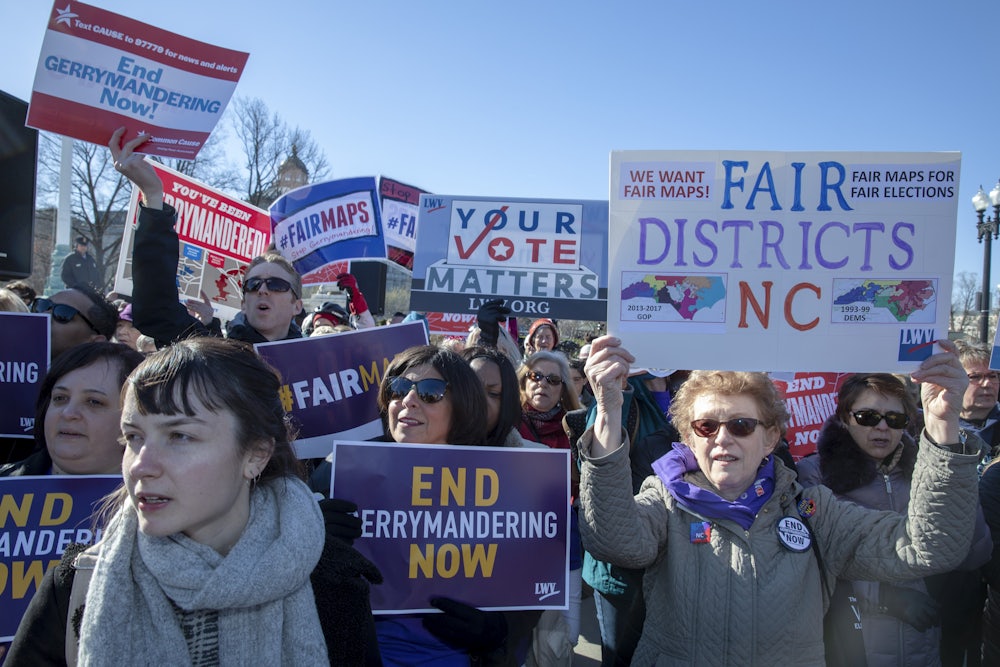Last year, voters in Virginia adopted a constitutional amendment to reform the state’s redistricting process ahead of the 2020 census. Instead of leaving it up to state lawmakers to draw new legislative maps for state and federal seats every decade, the amendment transferred that power to a bipartisan commission of regular citizens and state legislators. Though well intentioned, that effort to end partisan gerrymandering and ensure fair maps appears to have failed, in Virginia and beyond.
Many states adopted bipartisan redistricting commissions and other anti-gerrymandering reforms in the hope that they would lead to more equitable electoral systems. The problem is that only one political party is now generally faithful to the idea that elections should be open and competitive, with voters choosing their representatives instead of the other way around. With the Republican Party bent on using the status quo for maximal gain and a Supreme Court that is unwilling to stop them, Democrats must rethink whether electoral fairness can be achieved with redistricting at all—and what the alternative could look like.
The Virginia commission missed a required deadline to approve new state and federal legislative maps on Sunday, in large part due to a breakdown in trust among the bipartisan commission’s members. The commission’s Democratic members discovered earlier this month that the National Republican Redistricting Trust, a GOP-led group that helps Republicans draw friendlier maps, had helped a former state lawmaker draw one of the maps considered by the commission. The ensuing brouhaha over the NRRT’s involvement ultimately led to gridlock on the commission—and eventually to its failure to meet the constitutional deadline.
Ironically, the commission was originally billed as a bipartisan solution to partisan redistricting. The amendment drew support last year from a wide range of elected officials and advocacy groups. Top Virginia Republicans like former Governor George Allen and a host of state GOP lawmakers backed the proposal. So did prominent Democrats, such as Senator Tim Kaine and former Attorney General Eric Holder, one of the party’s most influential figures in redistricting fights. The state American Civil Liberties Union chapter, the reform organization FairVote, and the Brennan Center for Justice all gave favorable reviews of the plan, as well.
That enthusiasm was not universal, though. The most strenuous criticisms came from some of Virginia’s Black community, whose leaders warned that the proposal would almost certainly reduce their representation. “Voters should choose their elected officials, not the other way around,” Robert Barnette, the president of the Virginia chapter of the NAACP, said at the time. “But for too many years, politicians have drawn rigged districts that strip Black voters of our voice. We need to reform the system, not make it worse. Any redistricting amendment must include explicit and strong protections for Black voters and voters of color.”
Some Democratic state lawmakers also foresaw flaws with the commission’s structure and its potential for deadlock. If the commission is unable to propose new maps by a certain date, that responsibility instead falls to the Virginia Supreme Court. The court’s members are elected by the Virginia General Assembly to serve 12-year terms—a process that strongly favored state Republicans in recent years when influencing the court’s makeup.
“Some say Virginia’s justices are not partisan, and I hope that is indeed the case,” Mark Levine, a Democratic member of the Virginia House of Delegates, wrote in a Washington Post op-ed last year when arguing against the amendment. “But the most recent justice approved is the sister of a sitting Republican senator. Before that, the Republican-dominated legislature chose the right-hand man of right-wing former attorney general Ken Cuccinelli, after unceremoniously firing the bipartisan pick for the position. And a third justice is a former Republican legislator.”
Virginia is not alone in these struggles. Other states with redistricting commissions have run into trouble in recent months. Michigan’s citizen-led commission eliminated so many majority-minority districts in its new map proposals earlier this month, including two in the House, that it may violate the Voting Rights Act of 1965. In Colorado, which gained a seat after the 2020 census, a bipartisan commission approved a map that could lead to an incumbent-friendly split in the state House caucus. Except for one or two states, none of these reforms has hindered gerrymandering where it is most aggressive.
The aggregate consequences are inescapable. In 2018, the Associated Press found that House Republicans won around 16 more seats than they deserved, thanks to undeserved structural advantages. Why the imbalance? States with Democratic majorities are more keen to adopt redistricting reforms, reflecting their base’s general opposition to gerrymandering and favor toward good governance. In states where Republicans hold all or most of the levers of power, however, redistricting is largely left to the Republican-led state legislatures. The result, especially over the past decade, was a sharp increase in extreme partisan gerrymandering that created safer and safer seats for Republicans while packing Democrats into a shrinking handful of districts.
Texas might be the best example of these imbalances at the moment. State lawmakers just wrapped up the state’s first redistricting process without federal oversight under the Voting Rights Act of 1965 in roughly a half-century. Texas gained two seats in the most recent election, with the state’s growing Hispanic community accounting for nearly all of its population growth over the past decade. But those demographic changes will be conspicuously absent from the state’s new maps: According to The Texas Tribune, state GOP lawmakers reduced the number of House districts in which eligible Hispanic voters are the majority from eight to seven and the number of House districts in which eligible Black voters are the majority from one to zero. The GOP’s grip on Texas’s House seats will grow over the next decade, even as the state itself trends in the opposite direction.
So what is the alternative? Democrats and their allies should shift their focus toward passing a federal law that mandates proportional representation for House seats. This could be accomplished a few different ways. The Fair Representation Act, a bill reintroduced by Virginia Representative Don Beyer in June, would mandate multimember districts in large states and statewide at-large districts for small states. I’ve also written about how the existing single-member district system could be supplemented with a Bundestag-like mechanism to ensure each party’s seat distribution reflects the overall statewide results.
It is a tragic paradox that the push for anti-gerrymandering reforms at the state level may have made the House even less representative of the nation over the past decade. The time, energy, and resources that would be used to campaign for future redistricting commissions would accordingly be better used to rally support for proportional representation. Additionally, Democrats should also take the opportunity to wipe out as many GOP-friendly seats in the blue states as possible, using the same hardball redistricting tactics that were pioneered by Republicans over the past decade.
For many years, some of the firmest opposition to proportional representation—or, at least, to abandoning single-member districts—came from members of the Congressional Black Caucus. After a 1982 Supreme Court ruling on vote dilution and legislative seats, many Southern states packed Black voters into majority-minority congressional districts to comply with the Voting Rights Act. That shift created a series of ultra-safe Democratic seats that increased Black representation in Congress. But as the Cook Political Report’s Dave Wasserman recently noted, it also gave GOP state legislatures “a convenient, if cynical, legal rationale to keep Democratic votes bottled up in remaining hyper-packed Black seats.” Those broader consequences, he reported, have led some CBC members to rethink whether majority-minority districts truly lead to greater representation.
Adopting the GOP playbook will not be possible in every Democratic-led state since many of them, most notably California, have adopted redistricting commissions over the years. It’s possible that the Supreme Court’s emboldened conservative bloc may overturn the 2015 decision that upheld those commissions as constitutional, but such a ruling is far from guaranteed. Democratic lawmakers in other states, such as Illinois, New Jersey, and New York, may also be understandably reluctant to engage in overt partisan gerrymandering, after years of denouncing Republicans for doing it. The alternative, however, is ceding undeserved ground to an increasingly authoritarian political party at a perilous moment in American history.
As it stands, Republicans have no incentive to ensure fair representation in most of the country. The GOP can maximize its seat gains in red states with gerrymandering while minimizing any potential seat losses in blue and purple states with reforms. Indeed, these forces arguably contributed to the GOP’s radicalization over the last decade by pushing many House Republicans into increasingly conservative safe seats where the only electoral challenge is a further-right primary challenger.
It should be noted that some commission types are better than others. Truly independent commissions can indeed be a boon for fair representation. But since there is little chance that Republicans will enact them in the states they currently control, and since the Supreme Court has made it impossible to challenge extreme partisan maps in federal court, the only feasible alternative is to seek a more comprehensive solution to redistricting itself. Many voters, activists, and officials who opposed gerrymandering over the years did so because they wanted to ensure that American elections are fair and representative. Proportional representation, by its very nature, gives no unearned benefits to any one party or faction. To work toward it means abandoning losing battles over redistricting in favor of winning the war for American democracy.










